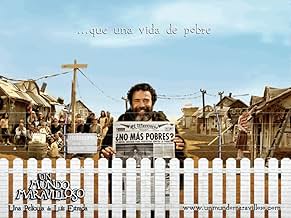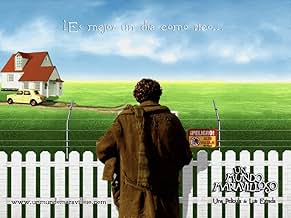NOTE IMDb
6,8/10
1,7 k
MA NOTE
Ajouter une intrigue dans votre langueThe minister of Economy gives a house, a car and job to a man who tried to jump from a building because of his poverty; soon, every poor tries the same strategy.The minister of Economy gives a house, a car and job to a man who tried to jump from a building because of his poverty; soon, every poor tries the same strategy.The minister of Economy gives a house, a car and job to a man who tried to jump from a building because of his poverty; soon, every poor tries the same strategy.
- Réalisation
- Scénario
- Casting principal
- Récompenses
- 11 victoires et 3 nominations au total
Pedro Armendáriz Jr.
- Director de 'El Mercurio'
- (as Pedro Armendáriz)
Avis à la une
I would like to comment on Felipe's opinion about this movie. He says that in Mexico (also my country) the poor people are not as poor as shown in the movie... well, I disagree. In Mexico you can find people even poorer without even shacks falling into pieces, homeless living in the streets, under bridges. He also says the riches are not that rich, and I can't conceive he states that. There are some really wealthy families living in El Pedregal, Santa Fe, Las Lomas; and some politician families are, without any doubt, as rich as they want. And I won't even argue the third state about politicians being THAT corrupt, because statistics talk for themselves and Mexico is shown as the 6° most corrupt country in LA and the 64° in the World (according to the Corruption Perception Index of year 2004).
And yes, the movie is barely OK, but Mexican cinema industry is getting better. And this movie is finally depicting the general situation in Mexico in a funny way, not like other really bad, sad movies. I recommend everyone to see the movie, enjoy it, and definitely, like Felipe says, don't think that's the situation in all the country, although it is in some parts. Watch the movie, and think it is telling just another story that could happen anywhere.
And yes, the movie is barely OK, but Mexican cinema industry is getting better. And this movie is finally depicting the general situation in Mexico in a funny way, not like other really bad, sad movies. I recommend everyone to see the movie, enjoy it, and definitely, like Felipe says, don't think that's the situation in all the country, although it is in some parts. Watch the movie, and think it is telling just another story that could happen anywhere.
When I watched this movie I thought I was going to sit down and enjoy a comedy and while it is very funny it is much more than a comedy. Immideately after every laugh I found myself thinking the same thing, "Wait, that's not supposed to be funny." Laughing at the shacks that thousands of people have to live in. Or, laughing at the fact that system is so mucked up that not even university-educated men and women can get a job as a janitor. These things are not supposed to be funny but Un Dia Maravilloso makes you laugh at them. Not that this film is evil for doing so. On the contrary, great satires make fun at things that are not supposed to be funny. The best example of this is Dr. Strangelove. The fate of the entire world is in the hands of these fools up the screen yet, we laugh at them (our world leaders included).
This movie is more than a black comedy. It is a comedy that makes you regret every laugh. It makes you regret every time you laughed at the dirty hobo up the screen. I watched it while in Mexico City last week and loved it. It's as thought-provoking as it is funny. It truly made me change my outlook towards poor people (truly poor people, people who don't know if they'll survive another day because lack of money). After leaving the movie theatre on my way to the hotel, I gave every beggar I came across fifty pesos. It isn't much, but I'd like to think that I eased their battle in a small way.
Besides highlighting poverty in Mexico it also brings about issues of corruption and social injustice. And which country in the world doesn't have any of those 3 things? Which is why you don't have to be Mexican to enjoy it. Run, don't walk, to Un Dia Maravilloso.
This movie is more than a black comedy. It is a comedy that makes you regret every laugh. It makes you regret every time you laughed at the dirty hobo up the screen. I watched it while in Mexico City last week and loved it. It's as thought-provoking as it is funny. It truly made me change my outlook towards poor people (truly poor people, people who don't know if they'll survive another day because lack of money). After leaving the movie theatre on my way to the hotel, I gave every beggar I came across fifty pesos. It isn't much, but I'd like to think that I eased their battle in a small way.
Besides highlighting poverty in Mexico it also brings about issues of corruption and social injustice. And which country in the world doesn't have any of those 3 things? Which is why you don't have to be Mexican to enjoy it. Run, don't walk, to Un Dia Maravilloso.
Not the best movie I've seen... not even dark, acid enough. It is to be taken as a farcical look at Mexican social reality.
Some things aren't shown the way they really are in my country, such as the ideal family portrayed in it or even the house or neighborhood they live in.
But the way public officials deal with matters such as those they are confronted to in this movie is close enough. The way super-rich live also pretty close to reality, houses and all (and yes, there really are super-rich people in Mexico... one of them even ranks just below Bill Gates according to Fortune Magazine).
As for the poor... millions of people live like that in my country, way below any concept of dignity or any other ideas or social values we are fortunate to have been taught and live by. They are born and die in misery, without the faintest hope of ever getting out of poverty. To be sure, they are not that articulate or sympathetic, of course, so you need actors and a script to play their roles, and that way it is actually possible to be entertained for two hours by their coming and goings, which in real life are much too harsh and painful to be called tragedy.
But particular features of any given human existence taken out, the movie lets you catch a glimpse of what could be called the results of the World's economic and political organization.
And then, it could also be called tragedy.
Some things aren't shown the way they really are in my country, such as the ideal family portrayed in it or even the house or neighborhood they live in.
But the way public officials deal with matters such as those they are confronted to in this movie is close enough. The way super-rich live also pretty close to reality, houses and all (and yes, there really are super-rich people in Mexico... one of them even ranks just below Bill Gates according to Fortune Magazine).
As for the poor... millions of people live like that in my country, way below any concept of dignity or any other ideas or social values we are fortunate to have been taught and live by. They are born and die in misery, without the faintest hope of ever getting out of poverty. To be sure, they are not that articulate or sympathetic, of course, so you need actors and a script to play their roles, and that way it is actually possible to be entertained for two hours by their coming and goings, which in real life are much too harsh and painful to be called tragedy.
But particular features of any given human existence taken out, the movie lets you catch a glimpse of what could be called the results of the World's economic and political organization.
And then, it could also be called tragedy.
I had really liked director's Luis Estrada dark political satire La Ley de Herodes and I was looking forward to this one. But A Wonderful World disappoints. It is a political satire/fable, and the premise is interesting. In a not too distant future, the Mexican Minister of Economy declares there is no more poverty in Mexico and plans to run for the leadership of the World Bank. However, a homeless drunk gets in his way. On paper, the movie should work like a charm. It's a very dark satire of the Mexican elite's indifference to the poor. But the execution is very flawed, even if the film boasts a veritable roster of some of the best Mexican acting talent around. This is what really bugged me: The rhythm is glacial. The plot meanders. And every scene is way too long. Every scene could have been cut in half and it would have still expressed its point, but Estrada loves the sound of characters cursing colorfully yet endlessly. He and his co-screenwriter, and the editor haven't apparently gotten yet William Shakespeare's memo that brevity is the soul of wit, and so it is with this film -- long and increasingly witless. Satire requires precise, surgical timing, economy of words and feelings and a coldish heart. None of this is in evidence here. There is a virulent strain of sentimentality coursing through this film's veins that really is unbearable. It's so bad that in scenes where the bum cries you can actually hear they added sniffles in post-production. So cheesy! There is a ridiculous, rather offensive love story, between the bum, played with great panache, and quite some hambone by Damián Alcázar, and a poor woman called Rosita, played by the unfathomably ubiquitous Cecilia Suárez. Now why is this offensive? 1. Because Cecilia Suarez is not believable as an impoverished inhabitant of a slum. She is tall and pretty and white as snow and and her attempts at sounding low class are absurd. I wonder if there are no other Mexican actresses available that don't look like they were born with a silver spoon in their mouths. She seems like she's trying to channel a silent film actress and the comic character of La Chilindrina, and she is not only insufferable but silly. Why could a poor woman not be anything other than a blathering, innocent imbecile? It is a disgraceful performance and no friend of anybody who is poor. 2. Because the Mexican rich and or middle class (and this includes the filmmakers) still think that the poor speak and behave like comic characters out of a 1940's movie. This may have been the intention, but it backfires, because instead of portraying them with some modicum of dignity, they are just corny stereotypes. Good hearted and innocent, to boot. This is patronizing. And patronizing is what the Mexican elites are and have always been to the poor. This is actually one of the points of the movie so it is rather maddening that this awareness didn't seep through to the way the poor are portrayed. The bum has a collection of bum friends (all great Mexican actors: Jose Carlos Ruiz, the great Jesús Ochoa and the great Silverio Palacios) and they are cool, but the direction as usual is as broad and unsubtle as if they were playing to the rafters in Azteca Stadium. 3. There is a sequence in a hospital which is a completely unnecessary, cheap, pathetic dig at Mexican Jews (which by the way, are like less than 1% of the general population). It's supposed to be a very fancy private hospital, called Sinai, and it seems like all the patients wear yarmulkes just so you don't miss the point that Jews are the only people in Mexico who can afford fancy hospitals, which of course is not true. An attempt at wit is to see signs for the spa and the golf course and the pool in the hospital's lush grounds. My heart froze when I saw this. It is amazing to me that screenwriters Estrada and Sampietro would write something so objectionable, so stereotypical, so inane and so uncalled for. 4. I can imagine what they were trying to achieve with the production design, which oscillates between the shiny modern Mexico and the slums, which are given a sepia, Fellinesque treatment, but even this seems pretentious and half baked. In short, a good idea terribly executed. Lazy and mediocre, written with more stupidity than wit.
No doubt about it, Estrada depicts some Mexico's political and social facts, however I find Herod's Law and A Wonderful World very similar.
I think Luis Estrada directs both movies following the same recipe.
Marginal class appear in both movies pretty good depicted; Mexican politicians as well; then come ridiculous circumstances that surround that lead both, politicians and poor people, beyond they ever dreamed: the politicians is rewarded for his criminal acts while the poor is dragged to his fate.
On Herod's Law the corrupt politician is rewarded becoming a Senator; on a Wonderful World the minister is awarded with Nobel Prize for starving the people. On the first movie the poor has to kill to get whatsoever he deserves (some respect and dignity) on the second movie this marginal family has to kill another family to get one single day of good life.
Herod's Law and A Wonderful World are pretty similar.
I think Luis Estrada directs both movies following the same recipe.
Marginal class appear in both movies pretty good depicted; Mexican politicians as well; then come ridiculous circumstances that surround that lead both, politicians and poor people, beyond they ever dreamed: the politicians is rewarded for his criminal acts while the poor is dragged to his fate.
On Herod's Law the corrupt politician is rewarded becoming a Senator; on a Wonderful World the minister is awarded with Nobel Prize for starving the people. On the first movie the poor has to kill to get whatsoever he deserves (some respect and dignity) on the second movie this marginal family has to kill another family to get one single day of good life.
Herod's Law and A Wonderful World are pretty similar.
Le saviez-vous
- AnecdotesCharacter Pedro Lazcurain is named after a Mexican president who lasted only one day in the job.
- GaffesThe portrait that appears in the house of the politician Lascuraian, the Secretary of Economy of México, is, in fact, the portrait of Porfirio Díaz, president of México (1877-1911), and not from José Ives Limantour, Secretary of Economy of México in Diaz administration
- Bandes originalesWhat a Wonderful World
Written by George David Weiss and Bob Thiele
Performed by Louis Armstrong
Courtesy of Universal Music México
Meilleurs choix
Connectez-vous pour évaluer et suivre la liste de favoris afin de recevoir des recommandations personnalisées
- How long is Un mundo maravilloso?Alimenté par Alexa
Détails
- Date de sortie
- Pays d’origine
- Site officiel
- Langue
- Aussi connu sous le nom de
- A Wonderful World
- Lieux de tournage
- Metepec, Mexique(location)
- Sociétés de production
- Voir plus de crédits d'entreprise sur IMDbPro
- Durée1 heure 58 minutes
- Couleur
- Mixage
- Rapport de forme
- 1.85 : 1
Contribuer à cette page
Suggérer une modification ou ajouter du contenu manquant

Lacune principale
By what name was Un mundo maravilloso (2006) officially released in Canada in English?
Répondre






























